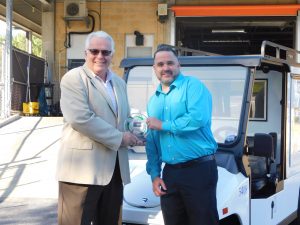 UF Facilities Services’ Supply Chain Management and Warehouse Operations (better known as Central Stores) recently won the University Logistics and Supply Chain Association’s 2017 Sustainability Award for its commitment to “applied sustainability best practices.”
UF Facilities Services’ Supply Chain Management and Warehouse Operations (better known as Central Stores) recently won the University Logistics and Supply Chain Association’s 2017 Sustainability Award for its commitment to “applied sustainability best practices.”
The recognition is the result of a number of sustainability-minded improvements undertaken by Central Stores over the past several years, which began with an interest to simply reduce waste but led to greater aspirations, according to warehouse manager Tommy Gonzalez.
Gonzalez said many materials received at the warehouse could not be handled through the traditional campus recycling program so Central Stores began internal recycling programs for batteries, ink cartridges, plastic film and pallets. By 2015, the warehouse had reduced the building’s landfill waste by 97 percent.
Enthused by this success, Gonzalez said the team began to analyze all aspects of their operations, starting with the facility itself. The 23,297-square-foot Central Stores warehouse was built in 1964 as a non-insulated brick building with a flat roof. Lighting and HVAC systems were inefficient and the building had no automatic control systems. The team began to implement every no-cost and low-cost improvement they could identify.
In 2013, Central Stores decided to enter into the EPA Battle of the Buildings Challenge. By 2015, the building became Energy Star-certified—the first one on UF’s campus.
In 2016, photovoltaic panels were installed on the warehouse roof that will generate 14 kW energy to offset energy use. Surplus energy will be fed back into the campus grid. The warehouse has become a flagship for sustainable operations at the university.
Gonzalez detailed further sustainability efforts by Central Stores in recent years, along with significant recognitions:
- An electric truck replaced a gas-powered 16-foot box truck for approximately 90 percent of the daily mail run and parts deliveries around campus—significantly reducing air pollution and fossil fuel use. An electric forklift reduced fuel costs and eliminated the negative impacts of operating gas-powered vehicles inside the warehouse.
- LED lighting was installed while improvements to HVAC, automated controls and other equipment have significantly reduced energy costs while improving the indoor environment.
- Frequently used vendors send deliveries in reusable totes to reduce packaging. The warehouse is the campus-wide receiving facility for recycling batteries, ink cartridges, plastic film, laboratory and other “special” plastics, cardboard and pallets.
- A common print station replaced four printers, one fax machine and a copier. Documents are scanned and electronically forwarded to accounting, and paper receipts are no longer used.
- Rechargeable battery charging stations were established so operations and maintenance staff could replace dead batteries for power tools with fully charged ones, at no cost unless they need new batteries.
- More than 60 percent of the building cleaning supplies purchased by Central Stores for campus-wide use are “green products,” including Green Seal hand towels and toilet tissue, microfiber dusters, peroxide based germicide and non-antibacterial hand soap.
- Inside the warehouse all waste cans except one were eliminated, along with the building exterior trash dumpster. Recycling stations for sorting and collecting metals, paper, cardboard, plastic film, wood and packaging materials (which are reused when possible) are located throughout the warehouse.
- Rain barrels were attached to drain pipes to capture rain water, which is used in the electric floor cleaner to keep concrete floors clean of dust and grime. Around the rain barrels. employees built xeriscape gardens and purchased a drum composter for food waste and unbleached paper towels. Paper towel and food waste composting are now expanding to buildings across UF, with 50 tons of organics per month going to a commercial composter.
- Dual-flush toilets were installed in the restroom, along with hands-free sinks with automatic shut-off.
Recognitions
2017
National Recycling Coalition Outstanding Higher Education Award for UF’s ongoing efforts to combine research, outreach and practices to reduce waste. While UF leads Florida in university and college waste diversion/recycling rates, the entire state is struggling to meet the 75-percent recycling goal. UF researchers are exploring which recyclables would result in the greatest life-cycle reductions in greenhouse gases, in order to focus programs on those materials.
2016
Recycle Florida Today Environmental Sustainability Award for its food waste and paper towel composting program that diverts approximately 50 tons of these organic wastes per month.
Prudential Productivity Award for accomplishments in sustainability. These awards honor Florida state employees who have significantly increased productivity while measurably implementing innovative and cost-saving accomplishments.
2015
U.S. Green Building Council (USGBC) Innovation in Green Buildings Award recognized Central Stores as its top warehouse contestant—having reduced its energy use by 16 percent in just six months.
Central Stores became a Certified Energy Star building with an overall score of 90.
2013
EPA Battle of the Buildings #1 in Warehouse in a competition of more than 3,000 buildings to reduce energy and environmental impact. Central Stores reduced energy use by 20 percent. In 2014, they cut energy and water costs by an additional 53 percent and another 30 percent in 2015.
